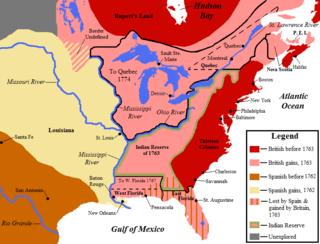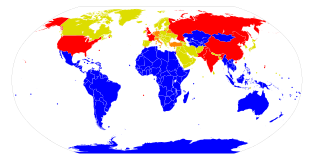This article needs additional citations for verification .(April 2018) |
This is a list of fictional countries supposedly located in North, Central, or South America.
This article needs additional citations for verification .(April 2018) |
This is a list of fictional countries supposedly located in North, Central, or South America.



Providence often refers to:

The Nine Nations of North America is a 1981 book by Joel Garreau, in which the author suggests that North America can be divided into nine nations, which have distinctive economic and cultural features. He also argues that conventional national and state borders are largely artificial and irrelevant, and that his "nations" provide a more accurate way of understanding the true nature of North American society. The work has been called "a classic text on the current regionalization of North America".

The Federal Republic of Central America, also called the United Provinces of Central America in its first year of creation, was a sovereign state in Central America that consisted of the territories of the former Captaincy General of Guatemala of New Spain. It existed from July 1823 to February 1841, as a democratic republic.

The Greater Antilles is a grouping of the larger islands in the Caribbean Sea, including Cuba, Hispaniola, Puerto Rico, Jamaica, and the Cayman Islands. Six island states share the region of the Greater Antilles, with Haiti and the Dominican Republic sharing the island of Hispaniola. Together with the Lesser Antilles, they make up the Antilles.

Crimson Skies is a tabletop and a video game media franchise created by Jordan Weisman and Dave McCoy, first released as a board game in 1998 and then as a PC game in 2000.

This is a list of historic regions of the United States that existed at some time during the territorial evolution of the United States and its overseas possessions, from the colonial era to the present day. It includes formally organized territories, proposed and failed states, unrecognized breakaway states, international and interstate purchases, cessions, and land grants, and historical military departments and administrative districts. The last section lists informal regions from American vernacular geography known by popular nicknames and linked by geographical, cultural, or economic similarities, some of which are still in use today.

The Knights of the Golden Circle (KGC) was a secret society founded in 1854, the objective of which was to create a new country, known as the Golden Circle, where slavery would be legal. The country would have been centered in Havana and would have consisted of the Southern United States and a "golden circle" of territories in Mexico, Central America, northern parts of South America, and Cuba, Haiti, Dominican Republic, most other islands in the Caribbean, about 2,400 miles (3,900 km) in diameter.

A nuclear-weapon-free zone (NWFZ) is defined by the United Nations as an agreement which a group of states has freely established by treaty or convention that bans the development, manufacturing, control, possession, testing, stationing or transporting of nuclear weapons in a given area, that has mechanisms of verification and control to enforce its obligations, and that is recognized as such by the General Assembly of the United Nations. NWFZs have a similar purpose to, but are distinct from, the Treaty on the Non-Proliferation of Nuclear Weapons to which most countries including five nuclear weapons states are a party. Another term, nuclear-free zone, often means an area which has banned both nuclear power and nuclear weapons, and sometimes nuclear waste and nuclear propulsion, and usually does not mean a UN-acknowledged international treaty.

Warday is a novel by Whitley Strieber and James Kunetka, first published in 1984. It is a fictional account of the authors travelling across the U.S. five years after a limited nuclear attack in order to assess how the nation has changed after the war. The novel takes the form of a first-person narrative research article and includes government documents, interviews with survivors and aid workers, and present-tense narration.

The Americas, also known as America, are lands of the Western Hemisphere, composed of numerous entities and regions variably defined by geography, politics, and culture.

The decolonization of the Americas occurred over several centuries as most of the countries in the Americas gained their independence from European rule. The American Revolution was the first in the Americas, and the British defeat in the American Revolutionary War (1775–1783) was a victory against a great power, aided by France and Spain, Britain's enemies. The French Revolution in Europe followed, and collectively these events had profound effects on the British, Spanish, Portuguese, and French colonies in the Americas. A revolutionary wave followed, resulting in the creation of a number of independent countries in Latin America. The Haitian Revolution lasted from 1791 to 1804 and resulted in the independence of the French slave colony. The Peninsular War with France, which resulted from the Napoleonic occupation of Spain, caused Spanish Creoles in Spanish America to question their allegiance to Spain, stoking independence movements that culminated in various Spanish American wars of independence (1808–33), which were primarily fought between opposing groups of colonists and only secondarily against Spanish forces. At the same time, the Portuguese monarchy relocated to Brazil during Portugal's French occupation. After the royal court returned to Lisbon, the prince regent, Pedro, remained in Brazil and in 1822 successfully declared himself emperor of a newly independent Brazilian Empire.

A territory is an administrative division, usually an area that is under the jurisdiction of a sovereign state. In most countries, a territory is an organized division of an area that is controlled by a country but is not formally developed into, or incorporated into, a political unit of the country that is of equal status to other political units that may often be referred to by words such as "provinces" or "regions" or "states". In international politics, a territory is usually either the total area from which a state may extract power resources or any non-sovereign geographic area which has come under the authority of another government; which has not been granted the powers of self-government normally devolved to secondary territorial divisions; or both.